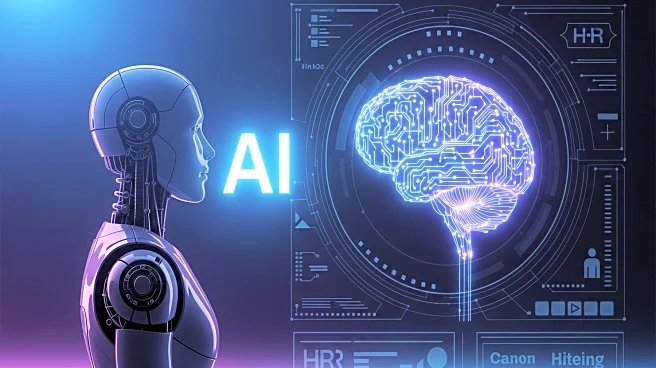What's Happening?
IBM's Chief Human Resources Officer, Nickle LaMoreaux, discussed the company's journey in integrating artificial intelligence (AI) into its HR operations at the HR Tech conference in Las Vegas. Since 2017, IBM has been utilizing AI, specifically Watson Assistant, to streamline HR processes. This initiative led to the creation of AskHR, a centralized platform for HR inquiries. Despite initial resistance and a drop in employee satisfaction scores, IBM persisted with the AI integration, resulting in significant improvements. The system now handles millions of transactions annually, with high adoption rates among managers and executives. The integration has also led to a 40% reduction in HR operating costs.
Why It's Important?
The integration of AI in HR at IBM highlights the potential for technology to transform traditional business functions. By centralizing HR processes and utilizing AI, IBM has improved efficiency and reduced costs. This case study serves as a model for other companies looking to leverage AI in their operations. The successful adoption of AI in HR can lead to enhanced employee experiences and operational efficiencies, which are crucial in today's competitive business environment. However, the journey also underscores the challenges of change management and the importance of aligning technology with organizational culture and employee needs.
What's Next?
IBM plans to continue refining its AI-driven HR processes, aiming for even higher adoption rates and further cost reductions. The company is focused on enhancing the AskHR platform to handle more complex inquiries and improve user experience. As AI technology evolves, IBM may explore additional applications within HR and other business areas. The company's experience may influence other organizations to adopt similar AI strategies, potentially leading to widespread changes in HR practices across industries.
Beyond the Headlines
IBM's experience with AI in HR raises important questions about the future of work and the role of technology in employee management. The shift towards AI-driven processes may require new skills and roles within HR departments, emphasizing the need for continuous learning and adaptation. Additionally, the ethical implications of AI in decision-making processes, such as hiring and performance evaluations, must be carefully considered to ensure fairness and transparency.










